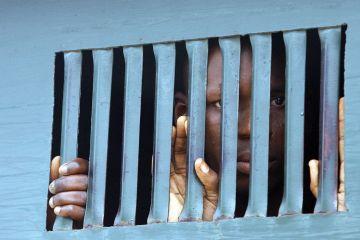
Firstly, the Ekwulobia Prison is not a maximum security prison; it lacks the requisite facilities necessary to withstand a major breakdown of law and order within and outside its four walls. Thus, ab initio, it is not qualified to house such high-profile and dangerous prisoners.

If there's one area the nascent Muhammadu Buhari-led Federal Government is undeniably not living up to expectations, it is the area of information dissemination and communication. It's disheartening how we don't get to hear anything about anything from the Presidency, despite boasting of two seasoned special assistants on media and publicity in its ranks. Consequently, we are left to the mercy of speculative journalism and hearsay from our media houses.
As a case in point, last week, about 47 Boko Haram suspects were whisked into the Ekwulobia Prison in Anambra state in the dead of night from other correctional facilities located in the northern parts of the country following a directive from the Federal Government. Predictably, the decision has not gone down well with a lot of people and it has met with widespread anger and condemnation.
Bearing in mind the delicate nature of the issue and sentiments that are already at a tipping point in the region, one would have expected that the Presidency – which initiated the action in the first place – would come out to either deny or confirm the allegations. Rather, it has elected to remain silent and ignore the matter as if it is a non-issue or an "unnecessary distraction" that will resolve itself and eventually die down in the course of time.
The sanctioning and actual transfer of the said persons to the said penitentiary portends a clear and present danger to the peace and harmony that pervades the state in particular and the South East region at large, as rightly pointed out by the member representing the zone in the Federal House of Representatives, Hon. Eucharia Azodo.
Firstly, the Ekwulobia Prison is not a maximum security prison; it lacks the requisite facilities necessary to withstand a major breakdown of law and order within and outside its four walls. Thus, ab initio, it is not qualified to house such high-profile and dangerous prisoners.
Secondly, the said prison had already been operating well above its installed capacity of a mere 85 prisoners for quite some time now before a further 47 inmates were added to the register a week ago, significantly increasing the feasibility of a major breakdown of law and order.
Finally and most importantly, it is located at the heart of a busy town home to almost 500,000 people. Ideally, prisons of any size are not meant to be located in the center of towns and cities or anywhere near them for obvious reasons, not to talk about prisons housing people accused of terrorism.
Ekwulobia is located within a sprawling agglomeration of densely populated towns, including, but not limited to Oko (which plays host to a federal polytechnic), Nanka, Agulu and Igbo Ukwu. Jailbreaks have been known to occur in more secure prisons nationwide and terrorists have often laid siege on military cantonments and barracks across the country, what is the capacity of the Ekwulobia Prison to resist such and what will be its impact on the hundreds of thousands of people residing in the area?
This possibility cannot be solved by merely wishing it away or saying that it can never happen. A good security system is one that prepares for the worst so that when the worst comes it will know how to approach it. The reported militarization of the prison and its environs does not solve any problem, rather it creates another problem of its own. It leads to a rising sense of fear, apprehension and intimidation among the locals. It gives the impression that all is not well.
Indeed, all is not well. The best thing the Presidency or the Federal Government can do now is to promptly release an official statement addressing the issue and intimating us on how it intends the resolve the problem. Doing so will go a long way in proving that it is not becoming increasingly distant and disconnected from the masses who voted it into office or indifferent to their needs.
Chinedu George Nnawetanma writes in from Enugu via [email protected]